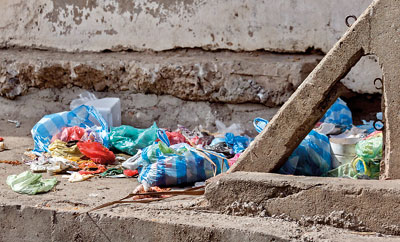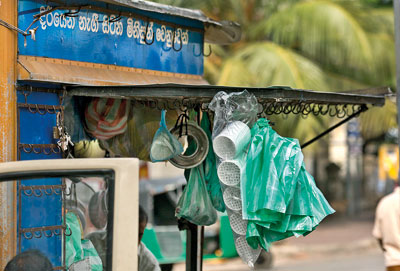News
Polythene industry trying to buy time, while standards body is ill-equipped
After intense lobbying by the polythene and plastics industry a grace period may yet be given to manufacturers.

Common sight: Garbageful polythene bags. Pix by Sameera Weerasekera
An official of the Ministry of Industry and Commerce is hopeful that a grace period will be given to the polythene industry to make the transition to biodegradable polythene.
Ministry secretary, Chintaka S Lokuhetti, said he hopes the Cabinet will consider a request by the ministry and extend the grace period by one year.
Manufacturers of polythene, the soft packaging industry, and allied industries have made representations to the ministry seeking a one-year transition period to high density poly ethylene.
It has been claimed that around 40,000 stakeholders in the polythene industry will be adversely affected by the ban on September 1.The Cabinet last week rejected a request by Prime Minister Ranil Wickremesinghe to extend the date of the ban by one year.
A committee made up of secretaries to the Ministry of Industry & Commerce, Ministry of Mahaweli development and Environment, and directors of the Central Environment authority, the Sri lanka Standards Institution, and representative of the Ministry of Finance has been formed.
“We are meeting again on August 30 and we will be moving for an extension,” Lokuhetti said.
Meanwhile, the Sri Lanka Standards Institution said it will facilitate testing of the polythene that would be available in the market after the ban.
Deputy director general, W N N Satharasinghe said the SLSI will test the biodegradable and compostable qualities of polythene and plastics. But, she said a testing facility is not available yet.

It has been claimed that around 40,000 stakeholders in the polythene industry will be adversely affected by the ban on September 1
Until testing equipment is imported, manufacturers will have to get certification from a global body. The SLS certification is not mandatory and obtaining it is solely at the discretion of the manufacturers.
Meanwhile, the SLSI is working with the University of Moratuwa, which is in the process of fabricating a machine to test bio-degradable/compostable polythene.
The CEA is preparing for the transition starting September 1.
Deputy director general, waste management, J M U Indraratne, said alternatives are being sought. Discussions have taken place with 11 manufacturers who have proposed biodegradable lunch sheets. “They said stocks are available,” Indraratne said. The Finance Ministry said it had no plans as it was only last week that the committee was appointed.

